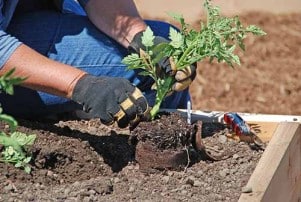By Seed Or By Plant, We Offer It All!
 You don’t need a green thumb to grow a bounty of fresh vegetables right in your backyard or in a raised bed. Whether you’re a gardening novice or just want to start a vegetable garden, we’re here to help you make the right decisions for your needs.
You don’t need a green thumb to grow a bounty of fresh vegetables right in your backyard or in a raised bed. Whether you’re a gardening novice or just want to start a vegetable garden, we’re here to help you make the right decisions for your needs.
Pick from a huge variety of seeds, or browse our courtyard for plants, ready to go.
Plant It
Decide how ambitious you want to get with your vegetable garden. No matter what size you decide to make it, be sure your chosen location gets at least six hours of sunlight. Consider whether you want to grow vegetables in the ground, raised beds, containers or a combination.
Pick Your Plants
If you plant seeds, instructions for planting are on the packets, and seeds take longer than starter plants to produce vegetables. We’ve done all the hard work by having many varieties of starter plants ready to go, including heirloom and organics. Ask what will work best in your space if you’re not sure. We’re happy to help!
Fertilize
Soil provides the nutrients your vegetables need to thrive. Enrich your soil if necessary by adding compost or garden soil. We offer many different soil amendments, including organic. Work a 3″ layer into the top 6″ of your soil. Also, check how well your soil drains by observing it after it rains: do puddles appear on the surface? If so, you may want to plant in raised beds instead.
Timing
With vegetables, timing is everything. Broccoli, carrots, lettuce, peas, and spinach like cool weather, so plant them in early spring before the last expected frost. Many cool weather vegetables can be planted again in late summer for a fall harvest. After the last frost date, when the soil has warmed, plant your warm-weather vegetables, like corn, tomatoes, cucumbers, and peppers.
Thank You Very Mulch
Weeds compete with your vegetables, stealing nutrients, water and sunlight, so be sure to keep them out as your vegetables grow. Apply a 3-inch layer of mulch around your plants to help discourage weeds by blocking growth and access to sunlight. Mulch also helps retain soil moisture, a critical factor in the Tri-Cities. Another incredibly useful method is a weed barrier.
Get Rid Of Pests!
Garden pests are just that… pests. They’ll eat your tender seedlings even before they have a chance to establish. They need to go. If you have pests, the least-toxic solutions should be used first — barriers & repellents, beneficial insects, biological pesticides, soaps and oils — and more stringent methods used only if necessary. We carry a variety of pesticides to keep your plants and veggies from becoming a snack for bugs and slugs. We also carry beneficial insects, so this kind of getting bugged is a good thing.
